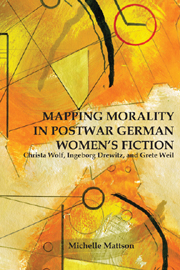Book contents
- Frontmatter
- Contents
- Acknowledgments
- Introduction
- 1 The Individual, Memory, and History
- 2 Feminism, the Self, and Community
- 3 Ingeborg Drewitz: Families, Historical Conflict, and Moral Mapping
- 4 Christa Wolf: Rehearsing Individual and Collective Responsibility
- 5 Grete Weil: The Costs of Abstract Principles
- Conclusion
- Bibliography
- Index
1 - The Individual, Memory, and History
Published online by Cambridge University Press: 05 February 2013
- Frontmatter
- Contents
- Acknowledgments
- Introduction
- 1 The Individual, Memory, and History
- 2 Feminism, the Self, and Community
- 3 Ingeborg Drewitz: Families, Historical Conflict, and Moral Mapping
- 4 Christa Wolf: Rehearsing Individual and Collective Responsibility
- 5 Grete Weil: The Costs of Abstract Principles
- Conclusion
- Bibliography
- Index
Summary
DREWITZ, WOLF, AND WEIL'S literary projects delve explicitly into how individuals construe their relationship to their historical present. Therefore, this chapter begins by gathering the tools to approach the issue theoretically. However, because individual perception of one's own imbrication in history, rather than a historiographical record of events, stands central to the inquiry, an attempt to discern the actual role of the individual in history is unnecessary. In other words, this analysis examines individuals' subjective processing of their place in history. Thus, the chapter explores various ways to conceive of our historical self-emplotment. Memory is one of the processes that individuals activate in their efforts to locate their place in history, but what is memory? What is individual memory? What is collective memory? How do individuals relate one to the other? After an examination of possible answers to such questions, the focus shifts to the links between memory and history. Finally, the chapter briefly discusses how these issues pertain to Drewitz, Wolf, and Weil.
On Memory: Definitions and Puzzles
A basic definition of memory would include the following: the ability to reproduce or recall what one learns and the collection of things that individuals retain from an activity or experience. Such a basic definition, however, does not reveal why people remember certain things and forget others. It does not tell us how we remember things. It also does not give any indication of what external factors influence what we remember, and it says nothing about the relationship between personal and collective memories of shared experiences.
- Type
- Chapter
- Information
- Mapping Morality in Postwar German Women's FictionChrista Wolf, Ingeborg Drewitz, and Grete Weil, pp. 11 - 37Publisher: Boydell & BrewerPrint publication year: 2010



